November/December 2021
Dear Friends,
We hope this publication of the Fellow’s flyer finds you and your family doing well. Here at Princeton in Africa, our Fellows have made remarkable progress in their fellowships, and our staff is currently undergoing the selection process for the next year’s cohort. We want to say thank you to our network for your support, and all the best to our applicants.
In this Fellows Flyer, we have articles written by three of our Fellows, and a special highlight of a Fellow’s achievement. To see more highlights of the work our Fellows do, make sure to follow our Princeton in Africa Instagram. Many of our Fellows have done Instagram Takeovers, where they give details about their day-to-day work, their organizations, and their work-from-home lives through Instagram stories.
We had an exciting event earlier this month, Language & Storytelling: How to Write and Speak About Africa with two esteemed speakers, Dr. Uzodinma Iweala and Dr. Mgbechi Ugonna Erondu. Uzodinma Iweala is an award-winning writer, filmmaker, and medical doctor. His published works include the novels Beasts of No Nation and Speak No Evil. As the CEO of The Africa Center in New York City, he is dedicated to promoting new narratives about Africa and its Diaspora. Mgbechi Ugonna Erondu, M.D., M.F.A. was a 2011 Princeton in Africa Fellow with the Botswana-Baylor International Pediatric HIV Initiative. She also holds a B.A. with Honors in Anthropology from Princeton University and certificates in African Studies and Creative Writing. She is currently a Pediatric Anesthesiology Fellow at Texas Children’s Hospital/Baylor College of Medicine.
Mgbechi and Uzodinma crafted an excellent conversation around African literature, identity, popular media, and shaping the African narrative. In case you missed it, please visit our youtube channel and watch the recording of the event. We are grateful for our speakers’ expertise and look forward to more PiAf speaker events to come next year. In other news, the staff and Board of Princeton in Africa are working diligently to review safety metrics for transitioning our Fellows to the continent. In November, our Fellows, staff, and a member of our Board met for a Covid-19 Updates & Fellow Check-in meeting. In this meeting, we discussed Covid-19 Reverse Tripwires, answered questions from our Fellows, and planned for future conversations around the health and safety of our Fellows and host organizations. Further updates to Fellows were sent out on December 19th, and a monthly email will be sent regarding the Covid-19 Reverse Tripwires. We are working towards a goal of sending Fellows to Africa while also ensuring their health and safety.
We want to extend a warm thank you to all the alumni, donors, and friends who offer continuous support to the Fellows and host organizations. We hope you have a great end to 2021, and we are excited to see what the next year brings.
Warm regards and Happy Holidays,
Damilola and The PiAf team
PiAf Connections
Please click below to check out pictures of our Fellows, Alums and other members of the PiAf family meeting up at home and around Africa.
Notes from the Field
By Haja Isatu Bah, '21-'22 Fellow with Mount Elgon Ecosystems Trust in Kenya
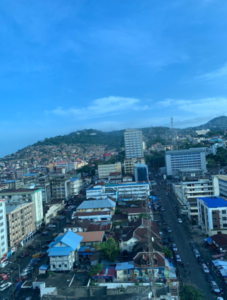
View from the 13th floor of the City Hall
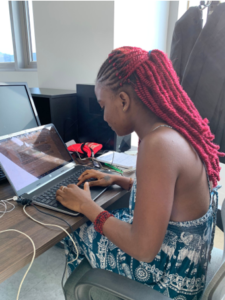
Working from my friend’s office
Greetings from Freetown, Sierra Leone! During this time last year, I had completed my application for PiAf, and I was waiting for the soonest response. About a week ago, I completed the first three months of my fellowship. It has been an amazing experience and I look forward to the remaining nine months with more enthusiasm. I can still recall reading my acceptance letter from PiAf – the amount of joy that filled my heart was exceptional. Not only did I get the fellowship of my choice, but I was also going to my dream country, Kenya. Even though I was going to start my fellowship remotely, the idea of remote work did not bother me at all. “It will be like one of my online classes,” I convinced myself.
I work remotely with El-Koony Center in the Mount Elgon region of Kenya as a communications and marketing fellow from my home in Freetown, Sierra Leone. The beginning of my fellowship was very challenging, as I underestimated what “working remotely” would be like. “It’s going to be chill; I do not have to wake up early, I can make my own lunch and take naps in between,” I told myself. I struggled with finding a convenient workspace, strong internet connection, and access to a laptop for the first few weeks. It was during the rainy season in Freetown and the electricity was very unstable.
However, I used, and I am still using this opportunity to explore more of Freetown and connect with the right people and resources to create a comfortable workspace for myself. I started working from cafes, restaurants, my friends’ offices, and any place I could get free electricity and Wi-Fi. This helped me establish a rigid work routine for myself and gave me more time to complete my tasks and enjoy my zoom and WhatsApp meetings.
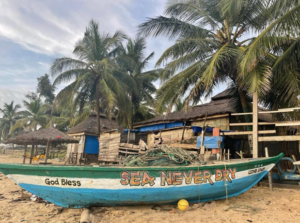
After work walk photos at Lumely beach
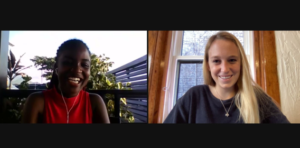
Meeting with my co-fellow, Catherine from Boston
I work with a very small team, and I am very lucky to be paired with another fellow. Even though we work with three different time zones – Nairobi, Boston, and Freetown, we have managed to settle on times that work for all of us. We successfully completed our first project on Climate Resilient Agriculture this month. I meet with my supervisor every day for an hour or two to go over my task lists, and we meet as a team once a week when necessary. I use the rest of my day to complete my tasks.
I really want to go to Kenya and experience all of this in person. However, I am grateful for this opportunity. I have been able to spend more time with my family, visit more places in Freetown, learn more about communications and marketing, do more research about Mount Elgon, its biodiversity, people, and culture, and build a connection with my co-fellow and supervisor. It is a win-win situation for me!
Notes from the Field
By Victoria Monge, '21-'22 Fellow with American Leprosy Missions in Ghana
Hello from Chapel Hill, North Carolina! Since July, I have been working for the NGO American Leprosy Missions (ALM). ALM supports people affected by leprosy and other neglected tropical diseases by providing treatment and preventative care, and by assisting endemic countries to improve health infrastructure.
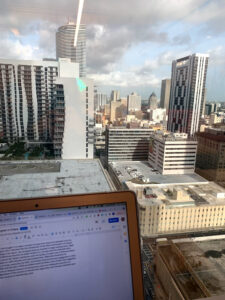
The view from my workplace in downtown Miami.
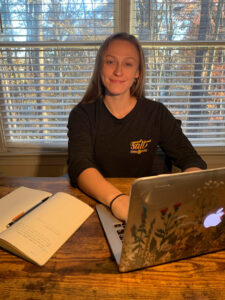
All set up for a day of work with my laptop and notebook.
While ALM works around the world, my work focuses on our projects in Western Africa, primarily in Ghana, Côte d’Ivoire, Liberia, Benin, and Senegal. In my role, I work with both the communications and programs teams to support a variety of projects. During my five months on the job, I have edited program reports for our grant funders, used my French skills to translate information for our Francophone partners, performed qualitative research to determine key findings from stakeholder interviews, and written donor-facing articles for our website. I love that I have so much variety in my work, as I feel that I have been able to grow many different skill sets during my time so far with ALM.
I also feel very lucky to have the opportunity to work with amazing colleagues who constantly impress me with their dedication to ALM’s mission and support of my personal goals. ALM is also a truly international organization, and I have enjoyed the opportunity to meet with and get to know coworkers spanning across four continents.
Although I am unfortunately still unable to travel to Accra, Ghana, where I would be located if not for COVID delays, I have still had the opportunity to do some traveling while working remotely. I began my fellowship over the summer in Miami, and since then I have worked from Ann Arbor, Michigan, Washington, DC, and Chapel Hill, North Carolina. I am hopeful that at some point I will be able to continue doing this fulfilling work from Accra. In the meantime, I will continue to make the most of my time with Princeton in Africa and American Leprosy Missions!
Notes from the Field
By Wilo Muyoma, '21-'22 Fellow with WARC Group in Ghana
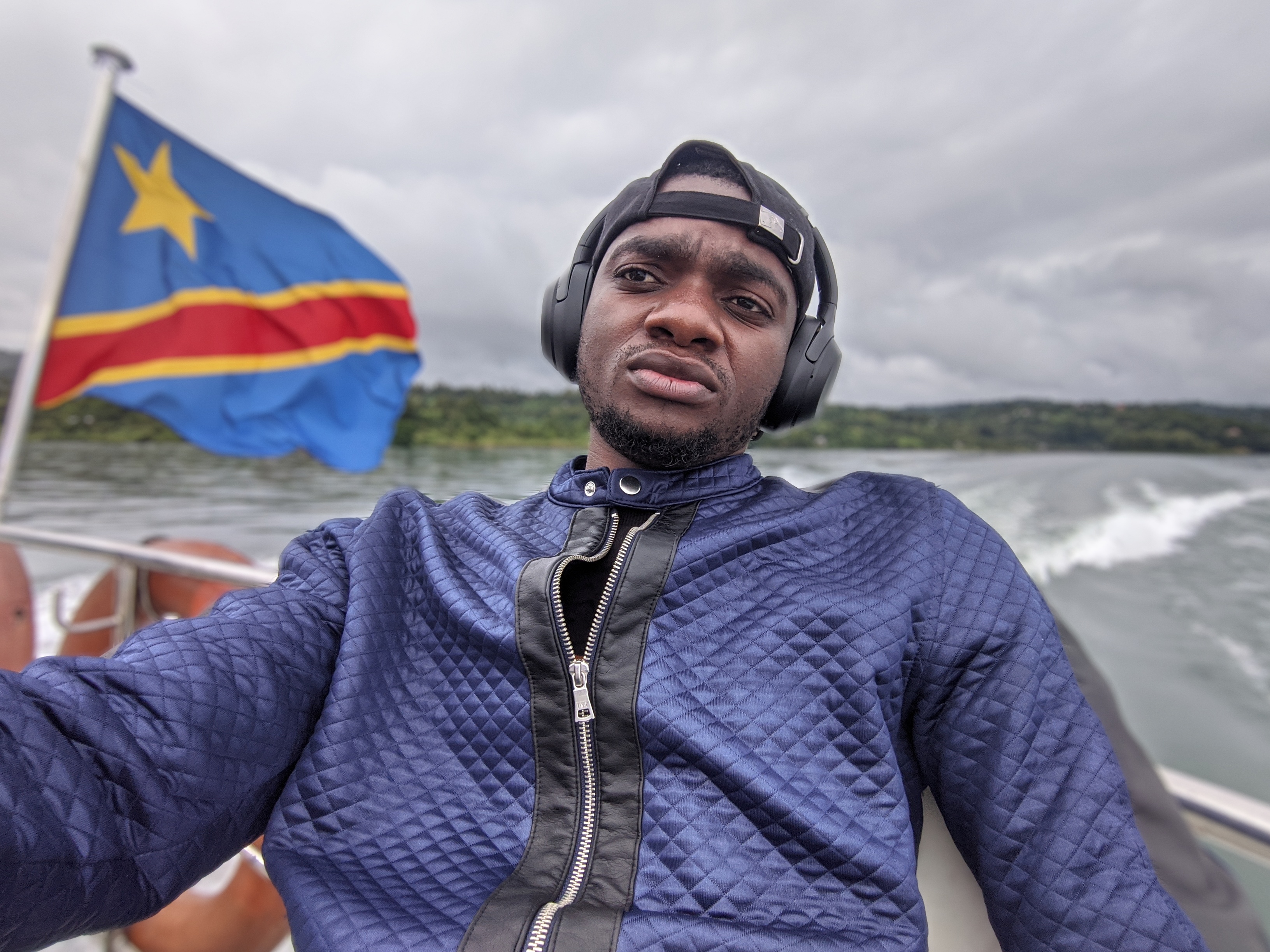
Boat riding from Goma to Bukavu in Democratic Republic of Congo
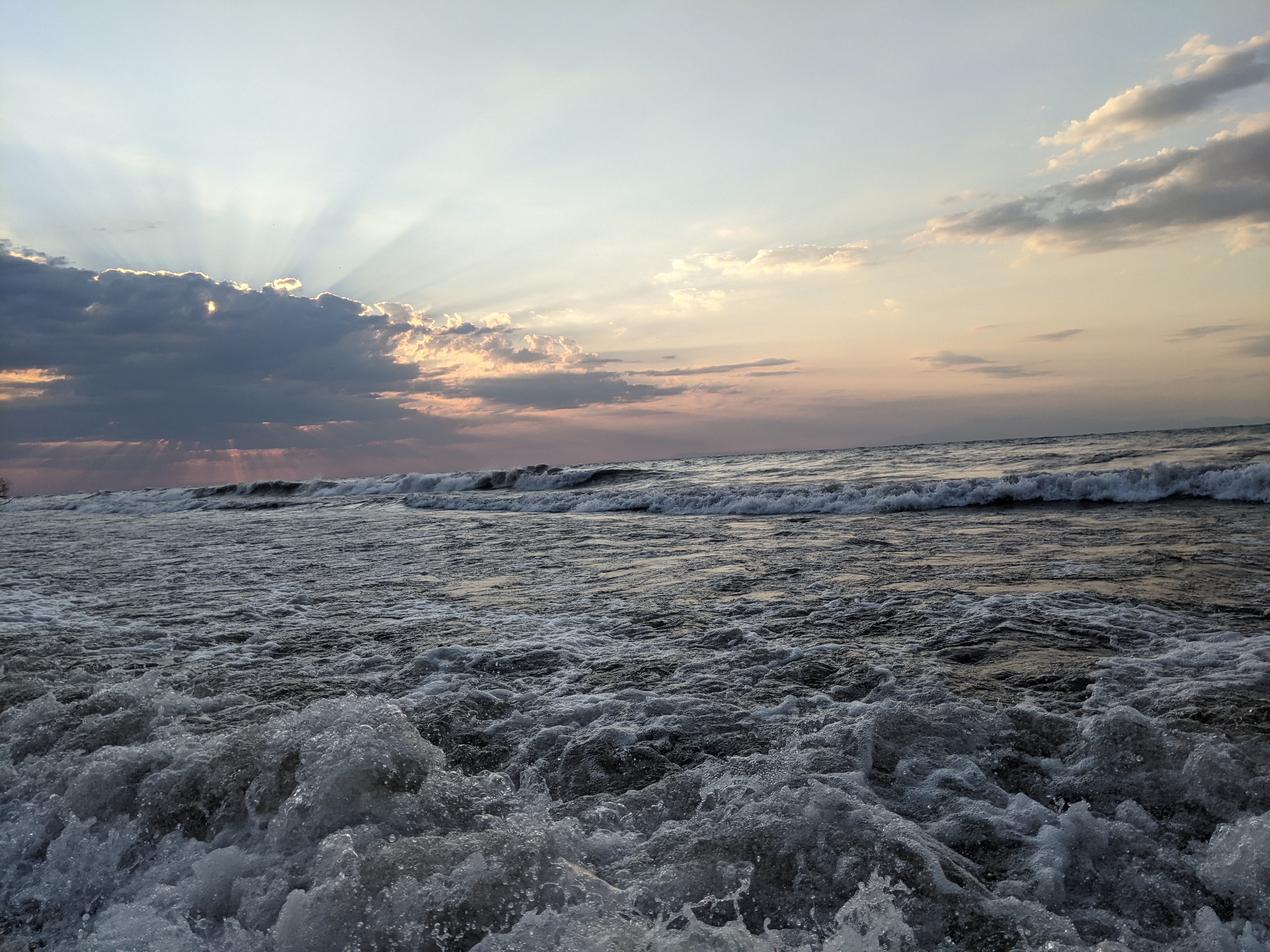
During an early morning walk near Lake Kivu
Hello from Goma, Democratic Republic of Congo! My name is Wilondja Muyoma, and I have been working as the Princeton in Africa fellow at West African Rice Company (Warc) Group. About four months ago, I officially had my first day as a PiAf fellow. So far, it has been an incredible journey filled with many opportunities for professional growth. Warc group is engaged in food production, nutrition improvement, and advisory services in Sierra Leone and Ghana. As a Monitoring & Evaluation Specialist, my daily tasks involve activities that measure the impact of our programs. Some of the metrics we measure include farmers’ livelihoods, farming practices, empowerment of women, and other metrics. Precisely, this could mean designing a survey strategy, verifying data quality, cleaning, analyzing, and reporting the findings.
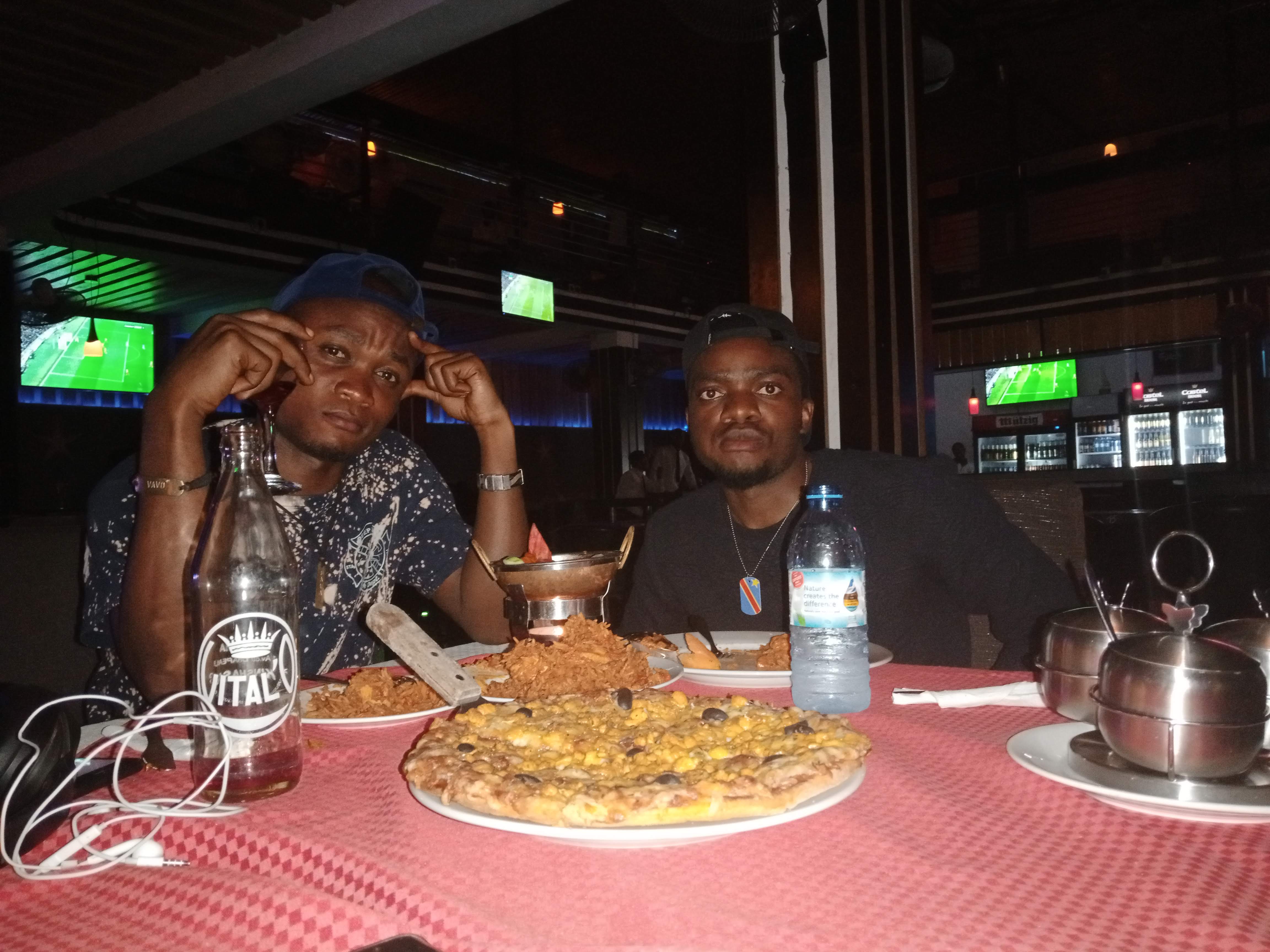
Cousins reconnect and share pizza at a local restaurant in Goma
What I appreciate the most at Warc Group is the commitment to regenerative agriculture practices. The fellowship has allowed me access to co-workers who are shaping the future of agriculture in Africa, and sometimes it is hard to process how much I have learned in such a short time. When I began my role at Warc, I knew very little about impact measurement and even less about agriculture. However, it has not always been smooth sailing. I work remotely from the city of Goma in the eastern Democratic Republic of Congo. Goma is about 5000km away from Warc’s office in Ghana. Living in this part of Congo comes with a fair share of challenges. Perhaps none of them are as irritating as unstable internet. Thankfully tools like WhatsApp have worked well enough to maintain contact with all stakeholders of my team at work.
While I wish to be with my teammates in Ghana, working remotely has allowed me to reconnect with family, cousins, nieces, and childhood friends after many years of living in the Seattle area. Goma is home to the beautiful Lake Kivu — I often enjoy long walks before or after work. I am very excited to see how the rest of my fellowship unfolds!
Notes from the Field
By Carolyn Qian, '21-'22 Fellow with Young 1ove in Botswana
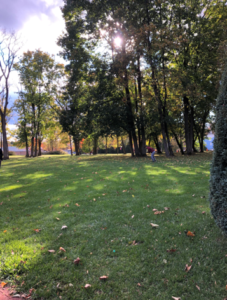
A view from my daily walk after work
Greetings from Tarrytown, New York! Although I initially expected to be based in Gaborone, Botswana throughout this year rather than near my hometown just north of New York City, I can confidently say that my fellowship so far has been filled with rich and rewarding experiences. While writing this, I have just hit the four-month mark in working as a Research & Innovation Fellow for Young 1ove, an organization in Botswana that implements evidence-based health and education programs for youth.
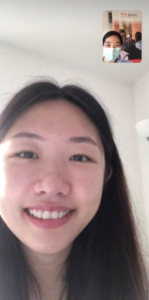
Taking a virtual tour of Young 1ove’s Gaborone office with another member of the Research & Innovation team, Amy, who is a former PiAf Fellow
Young 1ove prides itself on being impact-focused and a movement led by youth, for youth. While applying for a Princeton in Africa fellowship, I hoped to learn how to improve health education for communities so that it feels accessible and impactful for the individuals receiving it, and am thrilled to be working with an organization that embodies this mission. As a research team member, I regularly collaborate with our health and education field teams, which are made up of youthful, energetic local facilitators. Delivering our programs through these engaging teams allows for Young 1ove’s messages to establish maximum traction with students. For me, witnessing how the facilitators successfully translate their enthusiasm and energy into remote interventions during school closures due to the pandemic has been particularly awe-inspiring and helps me understand my colleagues’ passion for their work.
Something else that I especially appreciate about my experience at Young 1ove so far is how well integrated I feel with the team despite having not yet met any of them in person. In the Research & Innovation department, I stay connected via WhatsApp and Slack with my coworkers who live in not only Botswana but also Uganda, Zimbabwe, the UK, and the US. Additionally, I am excited to have joined Young 1ove at a time when the organization is scaling up to reach more students; currently, we are expanding Young 1ove’s evidence-based programming beyond Botswana via replication trials in Uganda, Eswatini, and the Philippines.
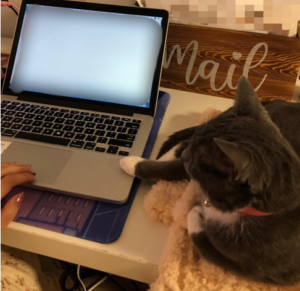
Grateful for this especially cute coworker, Remy, who is always lending a helping paw
In the past four months, I feel grateful to have participated in various aspects of enacting sustainable change through the organization, from drafting results for donors to conducting rapid impact assessments to working with outside partners and government departments. In the next stages of my fellowship, I eagerly look forward to learning more about the development sector and how I can further contribute!
During the PiAf orientation back in June, our fellowship class discussed our hopes and worries for what the coming year would hold. Would we be able to get to know our coworkers and integrate well into the fabrics of our respective organizations while working remotely? Would the time differences interfere with maintaining communication and camaraderie? Although I can only speak from my own experience, I am happy to report that the purpose and community I have found in PiAf and Young 1ove have exceeded my expectations. Signing off now – thank you for reading!
Notes from the Field
Highlighting Fellow Achievement: Haja Isatu Bah's TEDx appearance at TEDxmayoroffreetown
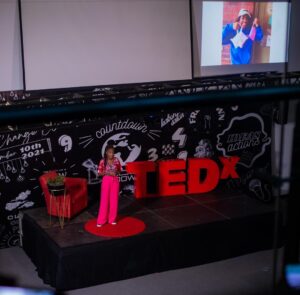 On December 10th, our Fellow Haja Isatu Bah made her first TEDx appearance at TEDxmayoroffreetown. Haja shared her work with Uman4Uman on the topic of Education for Climate Action. Uman4Uman is working with girls and women to switch to reusable pads and understand the environmental impact of disposable pads on our environment.
On December 10th, our Fellow Haja Isatu Bah made her first TEDx appearance at TEDxmayoroffreetown. Haja shared her work with Uman4Uman on the topic of Education for Climate Action. Uman4Uman is working with girls and women to switch to reusable pads and understand the environmental impact of disposable pads on our environment.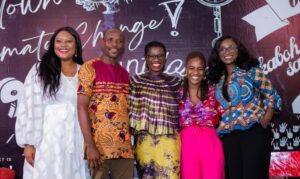 “I was honored to be one of the 6 speakers for the TEDx MayorofFreetown. My talk was on the topic of Education for climate action. I talked about the need for environmental education to protect our oceans and beaches in Freetown. It was a great platform to share the work my social enterprise, Uman4Uman is doing to address period poverty and reduce pollution from disposable pads with our sustainable, reusable sanitary pads.”-Haja Isatu BahWe are proud to have Haja as part of our PiAf network, and we applaud the work TEDxMayorOfFreetown is doing to elevate Voices From Freetown and accelerate solutions to the climate crisis in the African context.
“I was honored to be one of the 6 speakers for the TEDx MayorofFreetown. My talk was on the topic of Education for climate action. I talked about the need for environmental education to protect our oceans and beaches in Freetown. It was a great platform to share the work my social enterprise, Uman4Uman is doing to address period poverty and reduce pollution from disposable pads with our sustainable, reusable sanitary pads.”-Haja Isatu BahWe are proud to have Haja as part of our PiAf network, and we applaud the work TEDxMayorOfFreetown is doing to elevate Voices From Freetown and accelerate solutions to the climate crisis in the African context.









